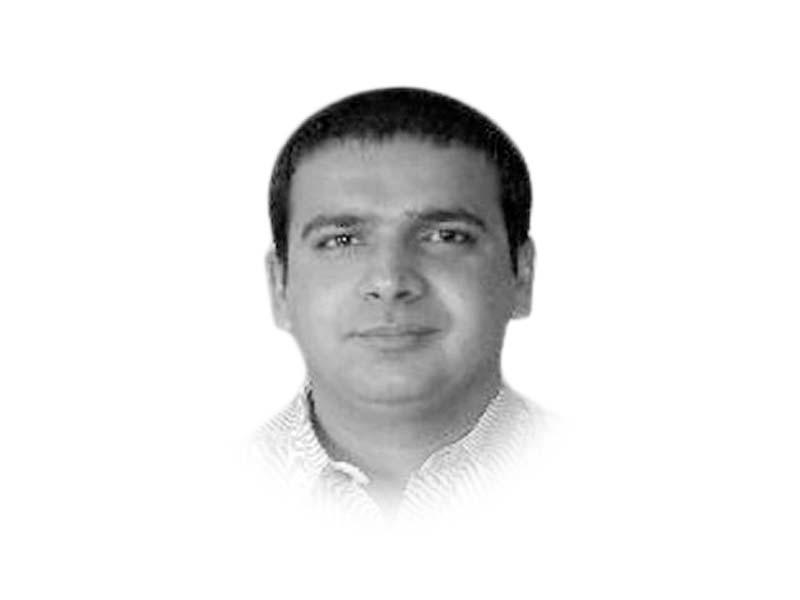
With history being our guide, higher are the chances that the victory of the PTI and its allies would not bring a transformational change in the political, economic and cultural outlook of the country.
There are logical reasons to be skeptical about the ability of the political class in general, and Khan in particular, to deliver desired results out of the elections. In the first place, the civil-military relations will be a big challenge for the PTI chief. Complex in nature and essence, the military’s role in political developments in Pakistan has been spoiling our capacity to become a democratic country. There are two important factors that would complicate the relationship between Khan as PM and the military establishment, and likely turn him into a failure. One, Khan would find it hard to challenge the establishment and influence the direction of foreign and defence policies vis-à-vis India, Afghanistan, China, Russia and the United States, and redefine them according to his own vision. Unfortunately, political polarisation in the country would give him little space to rely upon the political parties. Two, amongst the institutions of the state, parliament is the most disunited. Since it gives birth to the executive as well, the discordant relationships of the forces present in parliament provide avenues of opportunity to judiciary and civil-military bureaucracy to render parliament subdued.
Our effort to realise the probable reasons of Khan’s looming failure should not stop at the civil-military relations, however. We need to be mindful of the post-colonial nature of our polity whereby we have meshed up our yearnings of indispensable leaders and institutionalised nature of democracy to produce electables. The post-colonial societies, including Pakistan, meshed up both to produce pseudo-democratic political clans. These scions of the bureaucratic-feudal-industrial class claimed “democratic legitimacy” acquired through “political inheritance” while exercising coercive measures and condoning the miserable living conditions of the masses at large. The so-called “democratic monarchs” of local, regional, provincial, and national levels have relied upon the “services” of their forefathers extended to the impoverished sections of society to demand ideological-cum-political allegiances. Needless to say that the concept of political inheritance negates the very essence of democracy. The society and its lower economic strata, unfortunately, has been subjected to the evil of “no other choice” because of an excessive control of these clans. Khan and his party have failed to understand the genealogy of this dilemma and its deep effect upon the polity of Pakistan.
Having struggled for 22 years, Khan appears to have exhausted. To his credit, he has achieved a lot. He has brought the educated and upper middle class of the country back into politics. He has reinvigorated a new sense of intolerance towards corruption and embezzlement, and has created a new sense of ownership of the “public money”. However, once in power, he will face a strong challenge from the clan of so-called “electables”. A group of roughly 300 families, spread across the country, switch their allegiance to the incoming party and ruin it by the time it reaches next round of elections. They are the evil necessity of every aspirant of the crown and are an effective tool of manoeuvrability in the hands of non-democratic forces. The political mules, lacking capacity of leading from the front, align to anyone willing to serve their material interests. The masses at large are controlled through these democratic stooges. With their numbers rising in every elections, one is reminded by the baffling nature of public decision-making process. It also shows that political parties have lost their credibility as legitimate source of public representation in parliament. When Khan accepts these stalwarts and their scions, whose loyalty to the ideology of his party is not only insubstantial but highly perilous, we find it hard to believe in his effectiveness as a leader capable of leaving a lasting imprints on the politics of country.
The future direction of democratisation in Pakistan will largely depend upon the performance of Khan’s government in three important aspects. One, an important factor of his popularity among the youth of the country is that he himself has not been tested in any public leadership position though his party has produced a mixed result of better performances in some sectors while broken promises in others. A large number of his sympathisers feel that Khan should be tested in the Centre. They believe that it will help them evaluate the competing narratives of national direction. However, the fact that provinces have been empowered through the 18th amendment leaves little space to the federal government to manoeuvr the policy directions except that an antagonistic Centre will impede certain policies at the provincial level. However, the PTI, a party with the slogan of localisation of governance, will play against itself if it adopts a confrontationist approach. Two, civil-military relations will require a permanent settlement as the country will not be able to afford any inter-institutional wrangling. Third, electables will become a monstrous problem for Khan and any government coming after him. He will not be able to ignore them altogether.
Khan can avoid from becoming a disappointment if he decides to embark upon an agenda of reformation. Though difficult to achieve, any such agenda will have to find out ills of our political system, some of the signs I have mentioned here. The new government will find fewer days of jubilation in view of the highly complex questions of social service, resource generation, terrorism, meritocratic structure and poverty alleviation. The solutions such as Sasti Roti and Peeli Taxi will not work anymore. A reformative agenda, first and foremost, will require bringing institutional balance of power and placing an end to the politics of electables. Whereas the defence establishment can be assuaged through a new contract, Pakistan will need to redefine its parliamentary system in favour of proportional representation in the legislative assemblies to quash the chances of electables from being kingmakers. Any such system will reflect the popular choice more effectively. Had such a system been in place, the PTI would have gained many more seats in the National Assembly in 2013. It will allow the rise of qualified technocrats and professionals to enter politics and improve the quality of legislation. Electronic voting and voting rights for overseas Pakistanis will enhance the power of representation. However, the reforms in judicial system will need greater collaboration with the judiciary. As a new power player in the system, a hyper-active judiciary will more likely interfere in government affairs at the cost of ignoring the quest of swift justice. It needs to be remembered that Khan will be doing all this from the position of weakness because he will not find enormous support from other parliamentary forces.
Does it mean that Khan will be a failure? It is possible. The consequences of any such outcome would create a lasting political depression in Pakistan. His tenure is, however, more likely to see produce some mixed results. If he could implement a reformative agenda, he will leave an irreversible impact over the politics of Pakistan.
Published in The Express Tribune, July 17th, 2018.
Like Opinion & Editorial on Facebook, follow @ETOpEd on Twitter to receive all updates on all our daily pieces.













COMMENTS (4)
Comments are moderated and generally will be posted if they are on-topic and not abusive.
For more information, please see our Comments FAQ